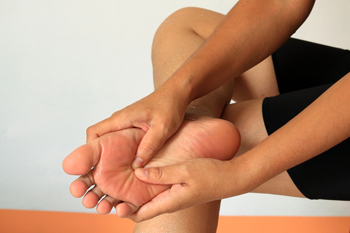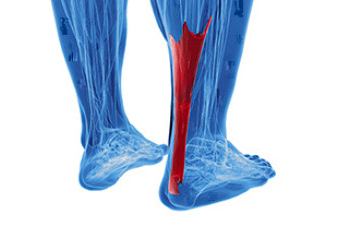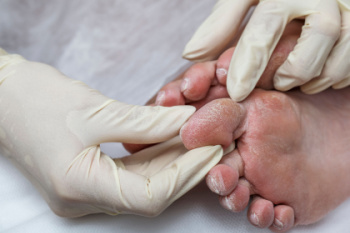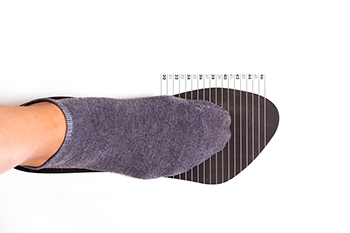Connect With Us
Blog
Items filtered by date: May 2024
Complications of Peripheral Neuropathy
 Peripheral neuropathy results from damage to the peripheral nerves, which are responsible for sending information from the brain and spinal cord to the rest of the body. This condition often results in tingling, numbness, and pain in the affected areas, typically the hands and feet. Due to high blood sugar levels common in diabetes, people with this disease are more prone to peripheral neuropathy and the associated lack of sensation in the feet. This loss of feeling means that injuries, pressure sores, or other foot problems may go unnoticed. Without prompt and proper care, such untreated injuries can develop into diabetic foot ulcers, serious wounds that heal very slowly due to impaired circulation. If these ulcers become infected and treatment is not working, the ulcer can progress to gangrene, which involves the death of body tissue. This sometimes necessitates amputation to prevent further health complications. Regular check-ups with a podiatrist, or foot doctor, can help manage peripheral neuropathy and prevent severe complications. If you have peripheral neuropathy, it is suggested that you add a podiatrist to your regular care team.
Peripheral neuropathy results from damage to the peripheral nerves, which are responsible for sending information from the brain and spinal cord to the rest of the body. This condition often results in tingling, numbness, and pain in the affected areas, typically the hands and feet. Due to high blood sugar levels common in diabetes, people with this disease are more prone to peripheral neuropathy and the associated lack of sensation in the feet. This loss of feeling means that injuries, pressure sores, or other foot problems may go unnoticed. Without prompt and proper care, such untreated injuries can develop into diabetic foot ulcers, serious wounds that heal very slowly due to impaired circulation. If these ulcers become infected and treatment is not working, the ulcer can progress to gangrene, which involves the death of body tissue. This sometimes necessitates amputation to prevent further health complications. Regular check-ups with a podiatrist, or foot doctor, can help manage peripheral neuropathy and prevent severe complications. If you have peripheral neuropathy, it is suggested that you add a podiatrist to your regular care team.
Neuropathy
Neuropathy can be a potentially serious condition, especially if it is left undiagnosed. If you have any concerns that you may be experiencing nerve loss in your feet, consult with Deann Hofer Ogilvie, DPM from Ascend Foot & Ankle Center. Our practitioner will assess your condition and provide you with quality foot and ankle treatment for neuropathy.
What Is Neuropathy?
Neuropathy is a condition that leads to damage to the nerves in the body. Peripheral neuropathy, or neuropathy that affects your peripheral nervous system, usually occurs in the feet. Neuropathy can be triggered by a number of different causes. Such causes include diabetes, infections, cancers, disorders, and toxic substances.
Symptoms of Neuropathy Include:
- Numbness
- Sensation loss
- Prickling and tingling sensations
- Throbbing, freezing, burning pains
- Muscle weakness
Those with diabetes are at serious risk due to being unable to feel an ulcer on their feet. Diabetics usually also suffer from poor blood circulation. This can lead to the wound not healing, infections occurring, and the limb may have to be amputated.
Treatment
To treat neuropathy in the foot, podiatrists will first diagnose the cause of the neuropathy. Figuring out the underlying cause of the neuropathy will allow the podiatrist to prescribe the best treatment, whether it be caused by diabetes, toxic substance exposure, infection, etc. If the nerve has not died, then it’s possible that sensation may be able to return to the foot.
Pain medication may be issued for pain. Electrical nerve stimulation can be used to stimulate nerves. If the neuropathy is caused from pressure on the nerves, then surgery may be necessary.
If you have any questions, please feel free to contact our office located in Lafayette, CO . We offer the newest diagnostic and treatment technologies for all your foot care needs.
Exploring Achilles Tendonitis

Achilles tendonitis is an ailment affecting the long tendon that connects the leg bones to the heel. This condition is particularly common among those engaged in high-impact activities, like running and jumping. The Achilles tendon's susceptibility to inflammation due to repetitive stress often leads to microtears and thickening. This results in Achilles tendonitis, which is characterized by posterior ankle pain and stiffness. However, the more severe consequence, an Achilles tendon rupture, typically occurs during forceful movements which result in sudden, intense pain and the inability to bear weight. Approximately 80 percent of Achilles tendon ruptures result in complete loss of function in the calf muscle. If you are experiencing pain in the Achilles tendon, it is suggested that you cease the activity causing the pain and make an appointment with a podiatrist as soon as possible. This foot doctor can conduct a thorough exam and determine the appropriate treatment.
Achilles tendon injuries need immediate attention to avoid future complications. If you have any concerns, contact Deann Hofer Ogilvie, DPM of Ascend Foot & Ankle Center. Our practitioner can provide the care you need to keep you pain-free and on your feet.
What Is the Achilles Tendon?
The Achilles tendon is a tendon that connects the lower leg muscles and calf to the heel of the foot. It is the strongest tendon in the human body and is essential for making movement possible. Because this tendon is such an integral part of the body, any injuries to it can create immense difficulties and should immediately be presented to a doctor.
What Are the Symptoms of an Achilles Tendon Injury?
There are various types of injuries that can affect the Achilles tendon. The two most common injuries are Achilles tendinitis and ruptures of the tendon.
Achilles Tendinitis Symptoms
- Inflammation
- Dull to severe pain
- Increased blood flow to the tendon
- Thickening of the tendon
Rupture Symptoms
- Extreme pain and swelling in the foot
- Total immobility
Treatment and Prevention
Achilles tendon injuries are diagnosed by a thorough physical evaluation, which can include an MRI. Treatment involves rest, physical therapy, and in some cases, surgery. However, various preventative measures can be taken to avoid these injuries, such as:
- Thorough stretching of the tendon before and after exercise
- Strengthening exercises like calf raises, squats, leg curls, leg extensions, leg raises, lunges, and leg presses
If you have any questions please feel free to contact our office located in Lafayette, CO . We offer the newest diagnostic tools and technology to treat your foot and ankle needs.
How Smoking Can Affect the Feet

Beyond the well-known effects on your lungs and heart, smoking can also severely affect your feet, particularly through a condition known as Buerger’s disease. This disease targets the blood vessels in the arms and legs, causing swelling and reduced blood flow, which leads to the formation of clots. Consequently, individuals may experience pain, open sores or ulcers, and gangrene, which if not properly treated by a podiatrist may lead to limb loss. While the precise cause of Buerger’s disease remains uncertain, one undeniable link is tobacco use. Chemicals in tobacco irritate blood vessel linings, which then triggers inflammation and constriction. Nearly all diagnosed cases of Buerger’s disease are associated with tobacco use, whether through cigarettes, cigars, or chewing tobacco. Prevention is key, and that begins with quitting smoking and avoiding all forms of tobacco. But prioritizing your foot health is also essential, and by seeking guidance from a podiatrist you can manage symptoms and receive the needed wound care. If you're experiencing any symptoms, it is suggested that you make an appointment with a podiatrist for an exam and treatment.
When dealing with systemic disease of the feet, it is extremely important to check the affected areas routinely so that any additional problems are caught quickly. If you have any concerns about your feet and ankles contact Deann Hofer Ogilvie, DPM from Ascend Foot & Ankle Center. Our practitioner will assist you with all of your podiatric needs.
Systemic Diseases of the Feet
Systemic diseases affect the whole body, and symptoms usually are displayed in the feet. This condition can make a patient’s ability to walk unbearable. Systemic diseases include gout, diabetes mellitus, neurological disorders, and arthritis.
Gout – is caused by an excess of uric acid in the body. Common symptoms include pain, inflammation, and redness at the metatarsal/phalangeal joint of the base big toe. Gout can be treated by NSAIDs to relieve pain and inflammation, and other drugs that lower the acid levels in the body.
Diabetes mellitus – is an increase in the level of blood sugar that the body cannot counteract with its own insulin. Failure to produce enough insulin is a factor in Diabetes.
Diabetes of the Feet
Diabetic Neuropathy – may lead to damaged nerves and affect the feet through numbness and loss of sensation.
Peripheral Vascular Disease – can restrict the blood flow to the feet, and often times lead to amputation of the feet.
If you have any questions please feel free to contact our office located in Lafayette, CO . We offer the newest diagnostic and treatment technologies for all your foot and ankle needs.
Plantar Warts Can Be Treated!
Measuring Shoe Size for the Best Fit

Ensuring the right shoe size is essential for comfort and foot health, especially when shopping online. Fortunately, measuring your shoe size at home is a simple process. Begin by gathering a ruler, a piece of paper, and a pen. Place the paper flat on the ground against a wall. Stand on the paper with your heel touching the wall. Using the pen, mark the longest part of your foot at the tip of your longest toe. Measure the distance from the edge of the paper to the mark in centimeters or inches. Repeat this process for the other foot as foot sizes may differ slightly. Finally, compare the measurements to a shoe size chart provided by shoe manufacturers or online retailers. Remember that shoe sizes may vary between brands, so it is essential to refer to specific sizing guides for accurate measurements. If you are experiencing any type of foot pain associated with the shoes you wear, it is suggested that you speak with a podiatrist who can treat foot conditions and offer additional guidance on how to find the right shoe size.
Getting the right shoe size is an important part of proper foot health. Seek the assistance of Deann Hofer Ogilvie, DPM from Ascend Foot & Ankle Center. Our practitioner will provide the care you need to keep you pain-free and on your feet.
Getting the Right Shoe Size
There are many people who wear shoes that are the incorrect size, negatively affecting their feet and posture. Selecting the right shoes is not a difficult process, so long as you keep several things in mind when it comes to choosing the right pair.
- When visiting the shoe store, use the tools available to measure your foot.
- Be sure there is ‘wiggle room’. There should be about an inch between your toes and the tip of your shoes.
- Do not always assume you are the same size, as manufacturers run differently.
- Purchase shoes later in the day, as your feet swell as the day progresses.
- If a shoe is not comfortable, it is not suitable. Most shoes can’t be ‘broken in’, and comfort should be the ultimate goal when it comes to choosing the right pair of shoes
As our feet hold our body weight and keep us moving, it is important to treat them right. Picking the right pair of shoes can provide your feet comfort and mobility without pain.
If you have any questions, please feel free to contact our office located in Lafayette, CO . We offer the newest diagnostic and treatment technologies for all your foot care needs.

